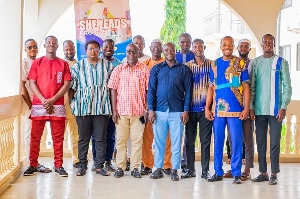 Members of COCs who participated in the training
Members of COCs who participated in the training
Community Aid for Rural Development (CARD) Ghana has held refresher training for Male Champions of Change (COCs) in the Upper West Region on gender transformative programming and influencing to promote social inclusion.
The training was aimed at equipping the male COCs with the requisite insights and skills to undertake transformative practices in their communities and fields of work.
The training, held on March 22, 2023, in Wa, formed part of the She Leads campaign, which is being implemented in the Upper West Region by CARD Ghana with support from Plan International Ghana.
Ernestina Biney, the Acting Executive Director of CARD Ghana, said it was expected that the male COCs, drawn from various government agencies, become aware of the need to provide opportunities for women at all levels of program design and implementation.
"Our main goal is for them [COCs] to understand that, at their level, during programming or implementing their own programs or making policies, they should take into consideration giving more opportunities to women, especially when it comes to decision-making and leadership," she said.
She observed that despite numerous campaigns for gender equality and gender mainstreaming, women's inclusion in many facets of social, economic, and political development was still minimal.
She, thus, expressed optimism that the refresher training would serve as a call and a reminder for them to influence women's inclusion in the design and implementation of programs and activities at their outfits.
Seidu Nurideen Damnakoro, the Wa Municipal Director of Complementary Education, indicated that women had great potential that society needed to transform but that those potentials were outshined by certain systemic barriers.
He cited cultural upbringing, fear, and inferiority complexes on the part of women, jealousy and hatred from fellow women, and the domineering nature of men as some of the challenges that affected women's participation in leadership and decision-making.
Mr. Nurideen advocated for the grassroots mobilization of women in areas of capacity building, confidence building, and self-worth realization to enable them to contribute to societal affairs.
Pognaa Amamata Alhaji Saaka Sansew, the Queenmother of Duori, said women's participation in leadership and decision-making has over time been proven very effective in the delivery of public services.
She said women and girls should be allowed access to quality education, as she believed that their education would enable them to contribute to society.
Ernest Maaldu, the Regional Director of the Rent Control Commission, called for the breaking of negative societal norms that have systemically contributed to women's exclusion in leadership and decision-making.
He said that until those societal norms were eliminated or reduced, women's participation in leadership and decision-making was never going to be effective, as they were deeply enshrined.
The male COCs pledged their commitments to promoting gender transformative practices in their fields of work to ensure the greater good of both women and men in society.
The male COCs were drawn from agencies such as Legal Aid, Complementary Education Agency, Ghana Education Service, Forestry Commission, Electricity Company of Ghana, Rent Control Commission, Municipal Assembly, and the media, among significant others.